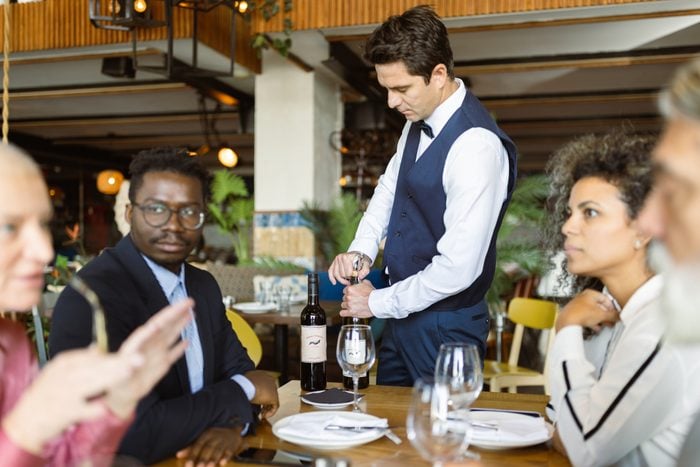
How much does a waiter observe about you?
Being detail-oriented is one of the best skills a restaurant worker can have. After all, that’s how they ensure your order is correct and everyone gets refills on time. But those people-watching skills extend beyond the table. Great servers are keen observers and will take notice of you—your attitude, appearance, way of speaking and other small details, including any rude restaurant habits you have or whether you exhibit any of these polite habits restaurant workers dislike.
“As soon as I walk up to a table, I’m looking for ways to connect with the customers, to relate to them,” says Jacob Cohen, a suburban Chicago waiter with almost a decade of experience. And it isn’t just about getting a better tip (although that’s always nice). Similar to what a flight attendant first notices about you, what a traffic cop first observes and what TSA agents look for, waiters heed these details about customers because they inform how they’ll do their job and better serve you. It also makes for a more pleasant dining experience.
We asked Cohen and other seasoned waitstaff to share what exactly they first notice about their customers—and why these observations are important.
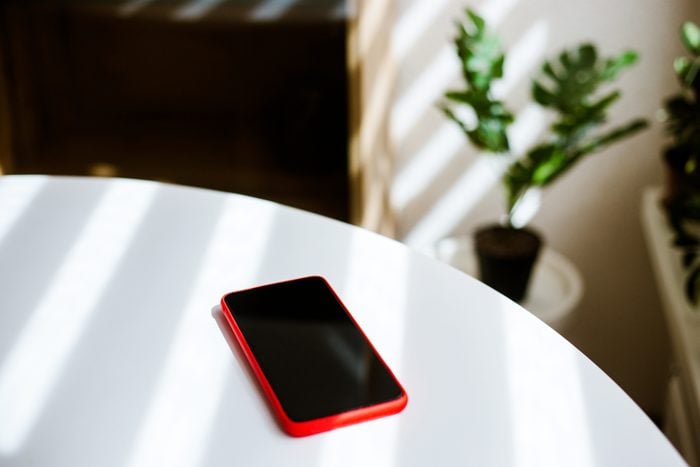
Where you put your phone
Proper dining etiquette says that you put your phone out of sight, in a purse or pocket, when eating out with others. But that rarely happens these days, says Katie Plowman, a restaurant server in Berkeley, California. “When I see people put their phone face up next to their plate, I think they are trying to multitask and perhaps won’t be as present during the meal,” she says. “On the other hand, some people will put it face down on the table, to show they’re paying attention. But it’s the ones who hold their phone in one hand during their whole meal, either taking pictures or looking at it, that worry me—are you really enjoying the experience of eating out? And are your companions enjoying eating with you?”
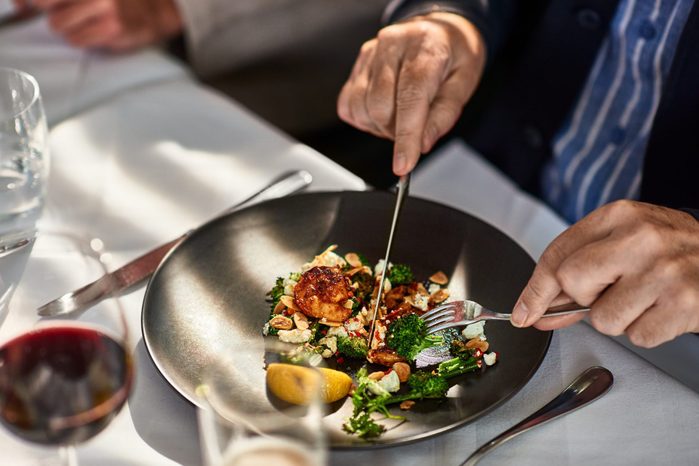
Your grasp of dining etiquette
Part of the fine-dining experience is how the staff serves you, but the other part is how well you understand dining etiquette, including which fork to use, where to place your napkin, how to order, which wine glass to use or whether you’re making these steakhouse etiquette mistakes. This tells staff how comfortable (or not) you may feel in the restaurant. It also suggests a bit more about your background or the type of business you’re in.
“I always notice right away when people are confused about table etiquette, and I’ll try to subtly help them out so they won’t feel embarrassed,” says Susie Lamer, waitress at an upscale eatery in Atlanta. “I get a lot of business clients who do big deals, and I’d hate for the deal to go south because they aren’t sure how to use a finger towel. I never knew that stuff until I worked here.”
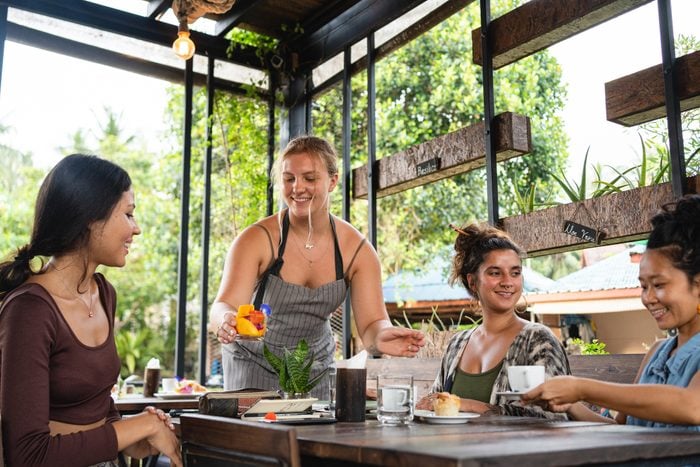
How you treat hospitality workers
“I love working in service and hospitality, but you definitely meet some people who think they are inherently better than someone who is ‘just a waitress,'” says Lamer. This can show in the tone of voice used to speak to staff, if they say please and thank you, if they feel entitled to extras and whether they make eye contact (eyes are one of the facial features people notice first), she says.
“It’s not just how they treat me, either. I can tell from the moment they walk in the door if they acknowledge the host politely or if they come in entitled.” How you treat bussers, cleaners, food runners and others in the restaurant industry says a lot about your character as a human being, she adds. “A kind person will be kind to everyone, not just the person they think can get them stuff.”
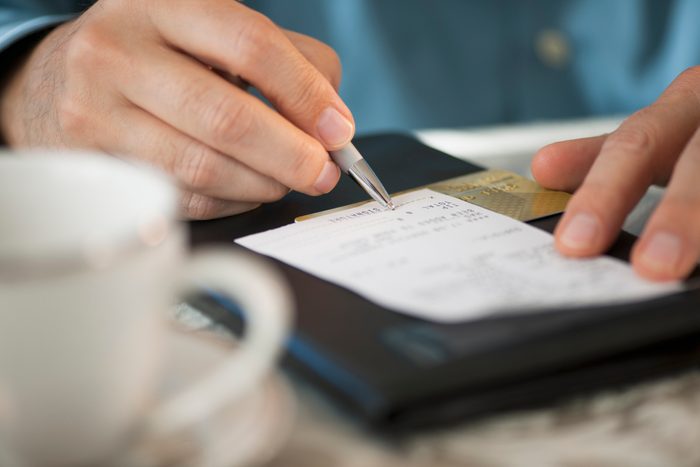
How you split the check
Are you the type to just hand over your card and not even look at the bill? “You are rich enough that you don’t have to worry about money, or someone else is paying your bills,” says Alexander Delmonico, a server based in Washington, D.C. If you forgo complicated math and just split the bill in half, he concludes that you “prefer things simple and quick, no fuss.” If you argue about the bill or pull out your calculator to figure out what each person owes, down to the penny, you’re very frugal and keep a close eye on your bank account, Delmonico says.
If you’re ever unsure about how to handle the bill, your server is likely happy to help. That’s just one of the waiter secrets servers want you to know.
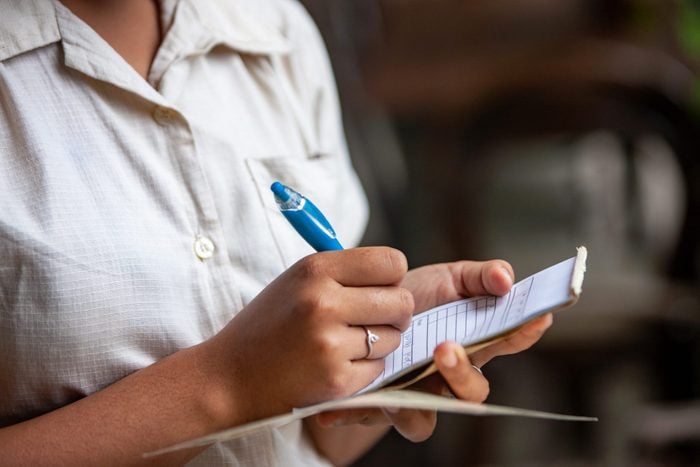
How you place your order
There are three types of people when it comes to ordering, and your ordering style says a lot about your kindness, empathy, table etiquette and what type of service you’ll need during your visit, says Delmonico. “There are those who quickly order straight off the menu, those who want to hear the list of specials (possibly twice) and deliberate for a bit, and those who want their meal custom-prepared and will spend 30 minutes asking detailed questions,” he says. “The last group is maybe 5% of customers, but they take up 95% of my time. They’re also the most likely to send their food back.”

How you interact with others at the table
Waiters are observant and pick up on everything, especially how people interact with those at the table—how couples look at each other, how friends sit (side-by-side or across), how parents treat their children or whether they exhibit impolite restaurant behaviors in front of friends and family. This informs how they’ll act as your server.
For instance, Cohen likes to make sure children don’t fall through the cracks during adult meals. “Throughout the years, I have encountered different types of people, and my favorite has always been families with kids,” Cohen says. “Being a kid at heart, I love to play games and interact. More often than not, the kids get ignored, but when I take care of my customers, I don’t ignore them, and in return, I get a nice tip out of it for listening to the child.”

Your willingness to speak up
“Sometimes, I’ll get people who just suffer through their meal because they’re afraid to say anything—maybe they don’t want to inconvenience me or they have some social anxiety, and I always feel so bad,” says Delmonico. (Not speaking up is also a fast-food faux pas.)
No matter how or what you order, it’s the restaurant’s job to accommodate you as best as they can. They want you to have an enjoyable meal, but mistakes do happen, and you should feel comfortable speaking up, he says. “You’re not ‘being a Karen.’ It’s our job to help you,” says Delmonico, adding that in his experience, it’s younger people who are less likely to say something.
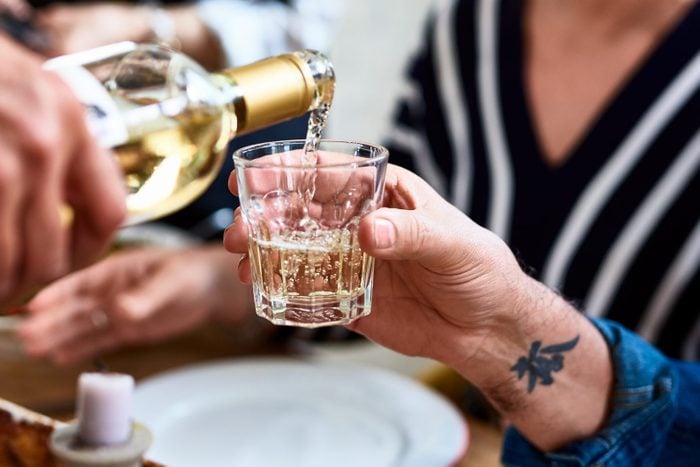
Sports jerseys, charm bracelets and other clues about your interests
A server is only as good as their ability to find common ground with their customers, says Cohen. So they notice little things, like a jersey or hat of your favorite sports team, your hairstyle, whether you wear fancy shoes, jewelry with sayings and charms or what tattoos you might have. Waiters like Cohen are looking for commonalities and conversational openings for small talk.
“Conversation is key in this industry. If you can’t relate with your customer on something, whether it’s current events, a recent show or a sports team, the restaurant industry isn’t for you,” he says. “If you can’t sell yourself, how can you sell the restaurant?”
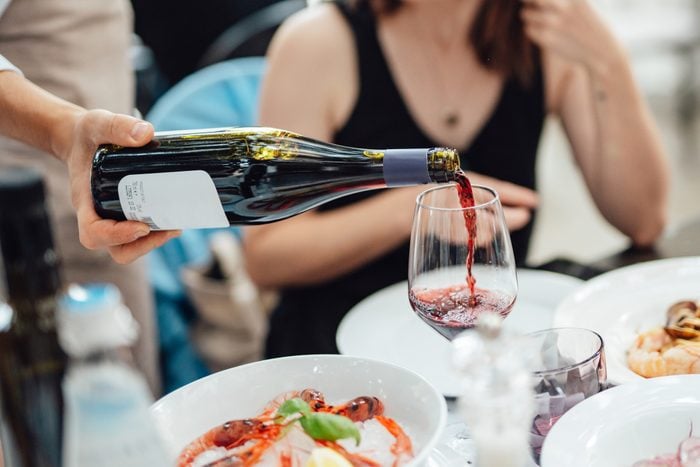
If you’re dining out on a holiday
If you’re choosing to dine out on a big holiday, there’s usually a reason. Perhaps you don’t have loved ones nearby or your religion or worldview means you don’t celebrate that particular holiday. Or maybe you just don’t like to cook meals with high expectations. Many servers can relate, but it is important to remember proper restaurant etiquette during the holidays, says Kristen McLeod, a veteran service industry representative. For instance, on Valentine’s Day, many of her patrons were folks who only went out on special occasions and would sit for hours—instead of eating at a normal pace and allowing her to flip the table and earn more income.
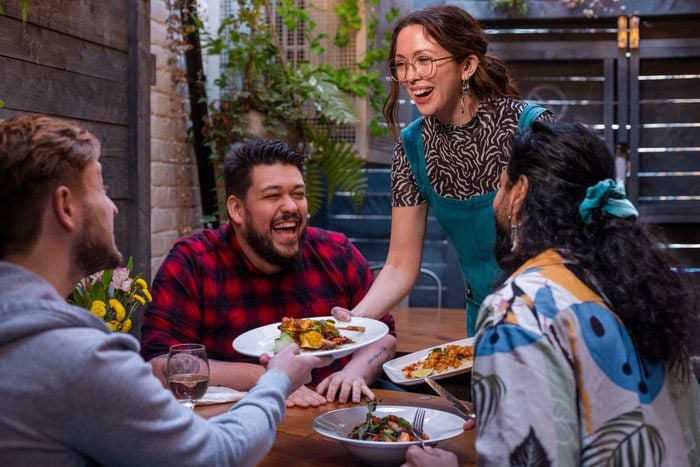
What kind of waiter you want
“If it’s a loud group of informally dressed people for a dinner service, I am more likely to take an informal attitude with them and be a bit more playful,” says Ben Myhre, who has a decade of experience as a waiter and bartender. “When I was looking at a table, I think it was important to try and assess why they were there and guess what kind of waiter they wanted. This involved looking at the people as a group, how they were dressed, and knowing the situation you are in.”

Whether or not you notice your server
While waiters pick up on what’s happening at their tables (and whether patrons are giving off a bad vibe), tables can also pick up on their waiter. McLeod remembers a specific experience she had as she approached a table. “The folks sitting there were also assessing me—deciding if I was a dud or one of the good ones,” says McLeod. “I developed a chameleon-like ability to perform what I figured they wanted—instantly—meaning I was lightning-flash fast at figuring them out.”
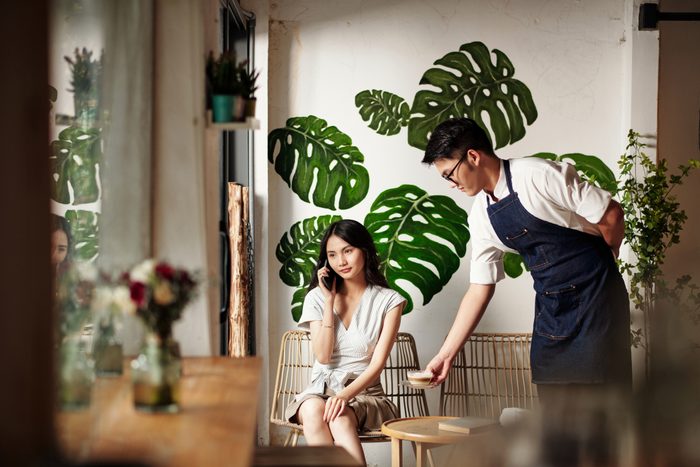
Your body language
In addition to clothing, body language is also a major indicator for waitstaff. “Instead of clothes, go by body language,” says Morgan Taylor, a former waiter. “It’s the old ‘You can’t judge a book by its cover.'” For instance, sitting with your arms crossed and eyes down means you probably don’t want to be interrupted, while an open posture may mean you’d like some light-hearted banter with your server.
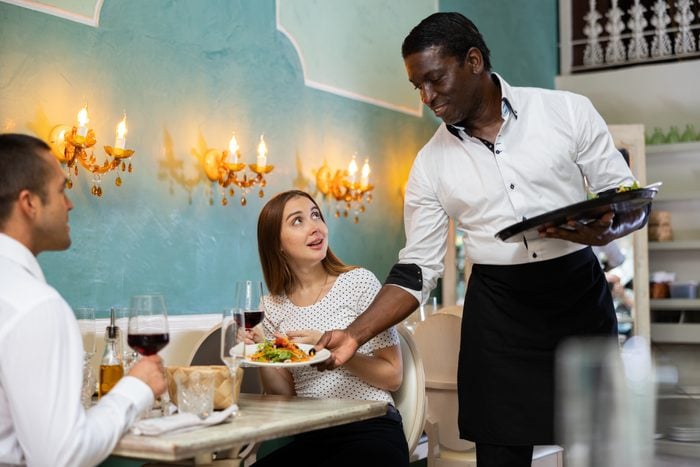
If you’re going to try something inappropriate
Waiters can often tell whether a guest is going to hit on them. “Are you going to try to pick me up later when [your partner] goes to the bathroom?” McLeod asks. “I developed a serious radar for [that] and learned to deflect early.”
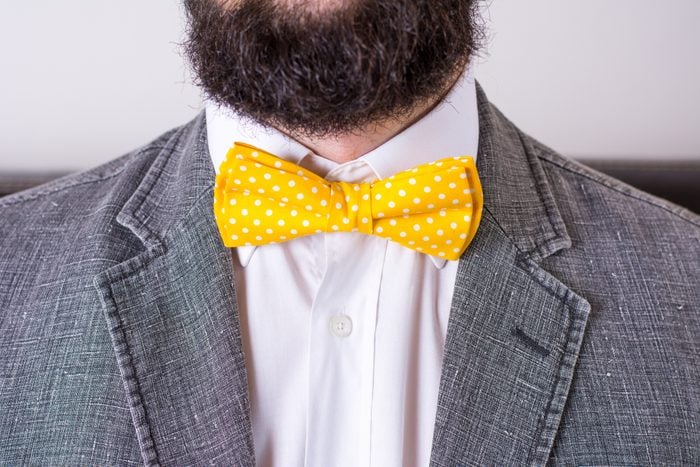
How you dress—without making judgments
“Trying to judge who will tip or not based on their clothes is wildly unpredictable,” says Taylor. “I have had the shabbiest-dressed characters leave $100 bills, while the best-dressed have completely stiffed me.” Wondering what other etiquette rules you should be practicing? These etiquette tips will help you mind your manners.
Additional reporting by Madeline Wahl.
Sources:
- Jacob Cohen, waiter
- Katie Plowman, waiter
- Susie Lamer, waiter
- Alexander Delmonico, waiter
- Kristen McLeod, service industry representative
- Ben Myhre, author of the Ramshackle Pantry
- Morgan Taylor, waiter
